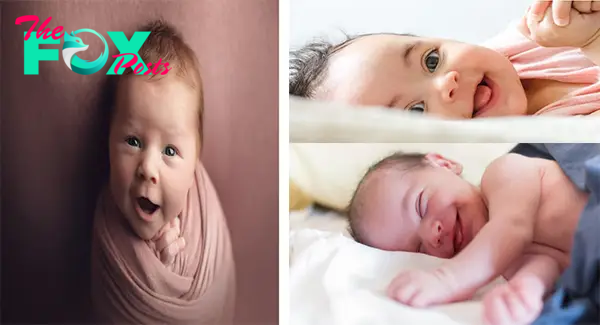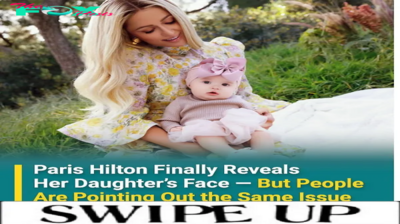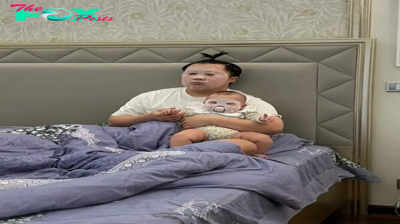Lifestyle
SOT.”What’s Cuter: That Precious Smile or That Little Nose? You Decide!”.SOT

Babies can smile in the womb, even before they are born. A baby’s earliest smiles are reflex smiles, not an attempt to imitate or engage with adults.
As babies grow, they develop more social skills and control over their movements. According to some experts, most babies begin regularly smiling between 6 and 12 weeks of age. Some may smile in response to a loved one’s smile a little earlier.

When do babies begin to smile?
Babies can smile from the moment they are born.
A real smile is one the baby gives in response to a parent or caregiver or reflects the baby’s content state.
When a baby is between 6–12 weeks, parents and caregivers should see more consistent smiles.
The Centers for Disease Control and Prevention (CDC) say that most babies give a real, non-reflexive smile when they are about 2 months oldTrusted Source.

Reasons newborns smile
Babies smile for many reasons, including :
Reflex smile: This is the smile babies develop in the womb. However, babies do it randomly, not in response to happiness or a caregiver. Therefore, experts do not consider it a real smile.
Social smile: This is a smile in response to contact with others, such as smiling back at a caregiver or smiling to get the caregiver’s attention.
As babies grow and develop, they may also smile when they are happy, whether or not they are interacting with a caregiver.

For example, a caregiver might see an older baby smile while playing with a favorite toy.
What if the baby is not smiling yet?
All babies develop on slightly different schedules. Individual differences, such as family interactions, cultural norms, and being born prematurely, may affect development.
Premature babies tend to reach developmental milestones later than babies born at term, so doctors often assign them a corrected age.
If a baby does not smile, parents should prioritize face-to-face interactions. Focus on smiling, playing, singing, and doing other activities the baby enjoys.
If the baby still does not begin smiling, it could signal a range of issues, including:
Vision problems: Blind or low-vision babies may not see their parents’ smilesTrusted Source or respond to them.
Hearing issues: Children with hearing impairments may not smile at the sound of coos, giggles, or a parent’s voice.
Autism: Autistic babies may not smile at caregivers or may have other differencesTrusted Source in social skills.
Temperament: Some babies are shyer, less interactive, or smile less readily than others. If a baby can and does smile but smiles less than some other infants, it might just be the baby’s personality.

Smiling and infant development
Reflex smiles simply mean that the muscles in the baby’s face work normally.
In the early weeks of life, babies try out a wide range of expressions. As they develop relationships with caregivers and deeper social connections, they begin to smile when they are happy or to imitate a caregiver’s smile.

When to see a doctor
Parents should discuss their baby’s developmental milestones at each routine Healthcare visit, especially if a baby has not hit age-typical milestones.
If a baby does not begin imitating caregivers’ smiles between 6 and 12 weeks of age, talk to a doctor.

-

 Lifestyle15m ago
Lifestyle15m agoRihanna confirms she’s going to Met Gala 2024 — and teases her red carpet look
-

 Lifestyle16m ago
Lifestyle16m agoKim Kardashian is back to blond in icy hair transformation ahead of Met Gala
-

 Lifestyle3h ago
Lifestyle3h agoCaptivating Charm: Exploring the Timeless Beauty of Gabi Champ, a journey into enchantment and allure.
-

 Lifestyle3h ago
Lifestyle3h agoParis Hilton Is Finally Revealing Her Daughter’s Face But People Are Pointing Out the Same Issue
-

 Lifestyle3h ago
Lifestyle3h agoHelen Mirren believed that the bikini snapshot her husband captured of her on the beach would remain a private, intimate moment – but internet didn’t listen
-

 Lifestyle4h ago
Lifestyle4h ago15 Fashion Moments That Are Truly Hard to Understand
-

 Lifestyle4h ago
Lifestyle4h agoFind Out If You Have Commitment Issues by Taking This Optical Illusion Test
-

 Lifestyle4h ago
Lifestyle4h agoA collection of photos when mothers are away from home and how fathers take good care of their children has returned to the online community with a burst of laughter.



















